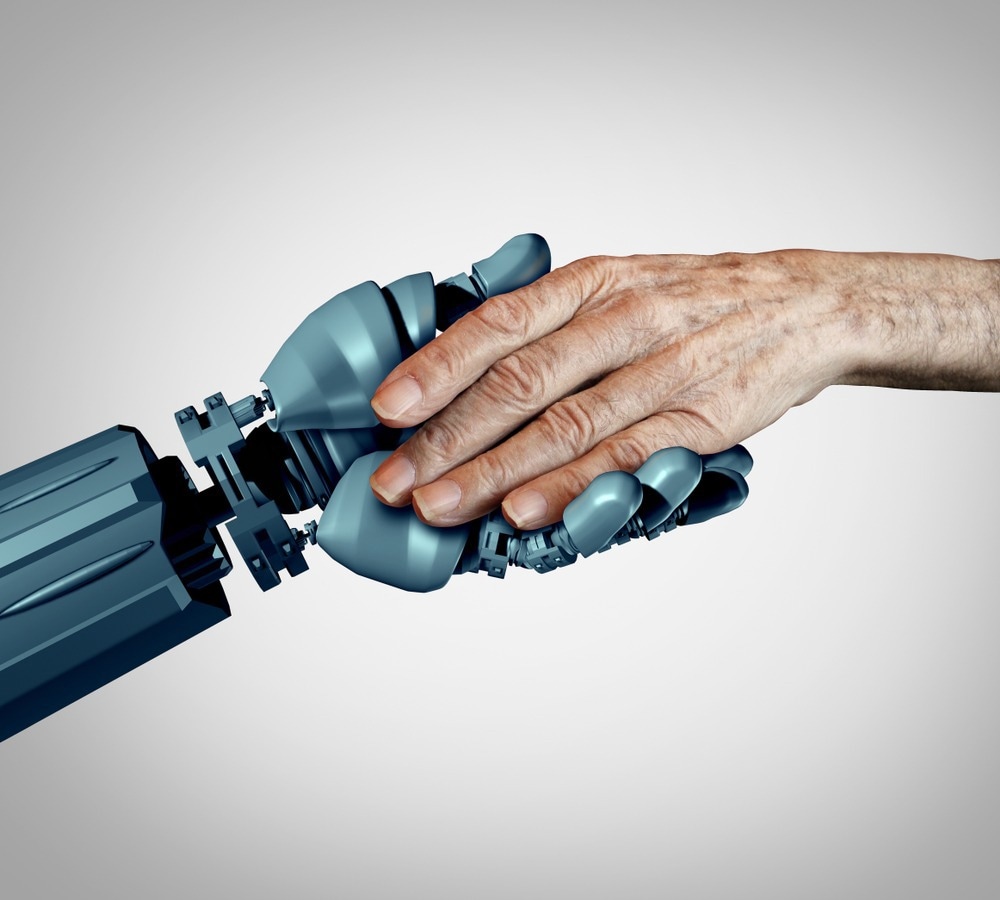Autonomous systems are becoming part of everyday life, whether it is your vacuum cleaner learning to clean the house on its own or your car getting you from point A to Point B with you sitting safely in the passenger seat. Autonomous systems have become necessary in almost every domain, whether manufacturing, design, logistics, finance or healthcare.

Image Credit: Spotmatik Ltd/Shutterstock.com
Autonomous Systems and Healthcare
The healthcare sector is a binding domain accelerating the integration of autonomous systems into its existing setup. Hospitals worldwide are utilizing autonomous systems to better the services they can provide to patients.
Autonomous systems have the enormous potential to revolutionize healthcare infrastructures, increase patient outcomes, significantly reduce operational costs, and facilitate new medical breakthroughs.
Academy of Robots, an artificial intelligence (AI) startup based in the United Kingdom, is on a mission to provide such autonomous systems to various sectors worldwide. The startup is teaming up with The National Health Service (NHS) to improve medical services in hospitals across The United Kingdom.
What Are Autonomous Systems?
As the influence of artificial intelligence grows, machines and other autonomous systems are becoming more productive and efficient with each passing day, owing to innovations by scientists and engineers all over the globe. These innovations assist organizations by saving essential resources such as time, cost, and human resources. Moreover, companies are utilizing artificial intelligence to enhance the skills of their workforce.
Several industries, including healthcare, security, and education, use artificial intelligence with little manual oversight. Artificial intelligence is highly effective for jobs requiring prolonged focus. In such circumstances, humans are prone to errors, yet an artificial intelligence-based autonomous system will maintain its resilience.
In addition, autonomous systems offer several benefits, including increased productivity and work efficiency, a significant reduction in human-related errors, a substantial improvement in the safety of employees, especially in high-risk environments, and lower running costs.
NHS and Academy of Robotics Join Hands
The National Health Service (NHS) is partnering with the Academy of Robotics to develop automated assistants referred to as Helper Bots. The Helper Bots will assist NHS workers by performing specific duties to relieve the significant workload on the NHS Workers. The startup first tested the Helper Bots at their R&D facility in Norfolk, United Kingdom.
The helper bot enables the NHS to perform various activities, including managing beds in units and disinfection scheduling, swiftly signing up new employees, and exchanging medical records data across agencies.
The research also seeks to cut the time hospital patients spend waiting for their medications, which is often the last step before release.
Affectionately nicknamed Milton, the helper bot is undergoing integrated testing at The Milton Keynes University Hospital before a planned 2023 rollout in other hospitals. Milton has already started traveling throughout the hospital from point A to point B, but the following year it will begin delivering medications on specified routes to aid medical workers.
The study's results will determine whether NHS can safely implement autonomous systems throughout the NHS and its affiliated hospitals.

Image Credit: Lightspring/Shutterstock.com
How Do The Helper Bots Work?
Like other projects by the Academy of Robotics, the helper bots utilize technologies such as LiDAR and Sonar sensors to keep track of the bot's position relative to other items in its surroundings.
LiDAR, which stands for Light Detection and Ranging, is a technology utilized by robotic systems to navigate the environment via perception, identification, and obstacle avoidance. The LiDAR system comprises a sensor or an array of sensors for measuring distance. The system produces light pulses, which reflect once they strike a particular target.
The system creates a map of its surroundings through calculations based on how long it took for the light to reflect and return to the sensor. LiDAR sensors can provide real-time data about the autonomous system's environment.
Like LiDAR sensors, sonar sensors emit sound pulses to determine how far an object is by tracking the time it takes for the sound waves to reflect and return to the sensor.
In addition to its sensor, the helper bots will have hatches in the front. These hatches can carry anything from medicines to surgical equipment. Human staff must manually open the hatches when the helper bot reaches its target destination.
These technologies, combined with the ability to carry essential items and to work in cohesion with human staff, allow the helper bots to seamlessly integrate into a hospital or any other medical care environment.
Academy of Robotic's Project Portfolio
Since its inception in 2016, the Academy of Robotics has been striving to produce products in the autonomous system domain to satisfy human beings' needs.
The startup created Kar-Go, a zero-emissions delivery system capable of reaching speeds up to 100 km/h. Kar-Go has been tested at the Royal Air Force facility in Oxfordshire, carrying hardware, materials, and toolkits to employees at different locations within the facility's confines.
Kar-go is a multi-level self-driving vehicle, able to drive up to level 4 autonomous driving. Level 4 autonomous driving capability means the delivery vehicle can perform all driving operations autonomously but requires an operator or supervisor to take control in particular circumstances.
Academy of Robotics has also created the Space-Bus remote command station to complement the autonomous driving system. Space-Bus is an independent vehicle monitoring solution that monitors autonomous vehicles on roads and highways to ensure that the cars follow the required safety standards.
The Space-Bus is mobile and thus can be deployed anywhere at any time, ensuring the autonomous vehicle follows safety protocols where ever it may go.
Conclusion
The world we live in is evolving because of autonomous systems. These autonomous systems are progressively shaping the future of humanity. Although this idea has several drawbacks, it is nevertheless a helpful technique. Since scientists and engineers create these artificial intelligence-based systems, they can control the system's capabilities and put them to good use.
With breakthroughs in autonomous delivery bot systems and artificial intelligence-based medical assistance, companies like the Academy of Robotics are helping revolutionize the future with the help of autonomous systems by providing solutions that positively impact human lives.
References and Further Reading
Hornstein, O. (2023). NHS trials robot helper to relieve hospital workload. NHS. Available at: https://www.uktech.news/medtech/nhs-robot-staff-20230104.
Szczepaniak, A. (2023). How is LiDAR used in Robotic Navigation? Pros and Cons. Leo Rover. Available at: https://www.leorover.tech/post/how-is-lidar-used-in-robotic-navigation-pros-and-cons.
Chadwick, J. (2022). Your robot will see you now! Self-driving NHS 'helper bot' named Milton is being used to transport medicines around hospitals as part of a new trial. Mail Online. Available at: https://www.dailymail.co.uk/sciencetech/article-11579907/NHS-trials-helper-robot-deliver-medicines-hospitals.html. Accessed 18th January 2023
Space-Bus: Bringing the safety and control of a testbed to any location. Academy of Robotics. Available at: https://www.academyofrobotics.co.uk/space-bus/.
Hesketh, R., Kleinman, M. (2021). Autonomous systems in healthcare: why trust matters. King's College London News Center. Available at: https://www.kcl.ac.uk/news/autonomous-systems-healthcare-why-trust-matters.
Disclaimer: The views expressed here are those of the author expressed in their private capacity and do not necessarily represent the views of AZoM.com Limited T/A AZoNetwork the owner and operator of this website. This disclaimer forms part of the Terms and conditions of use of this website.